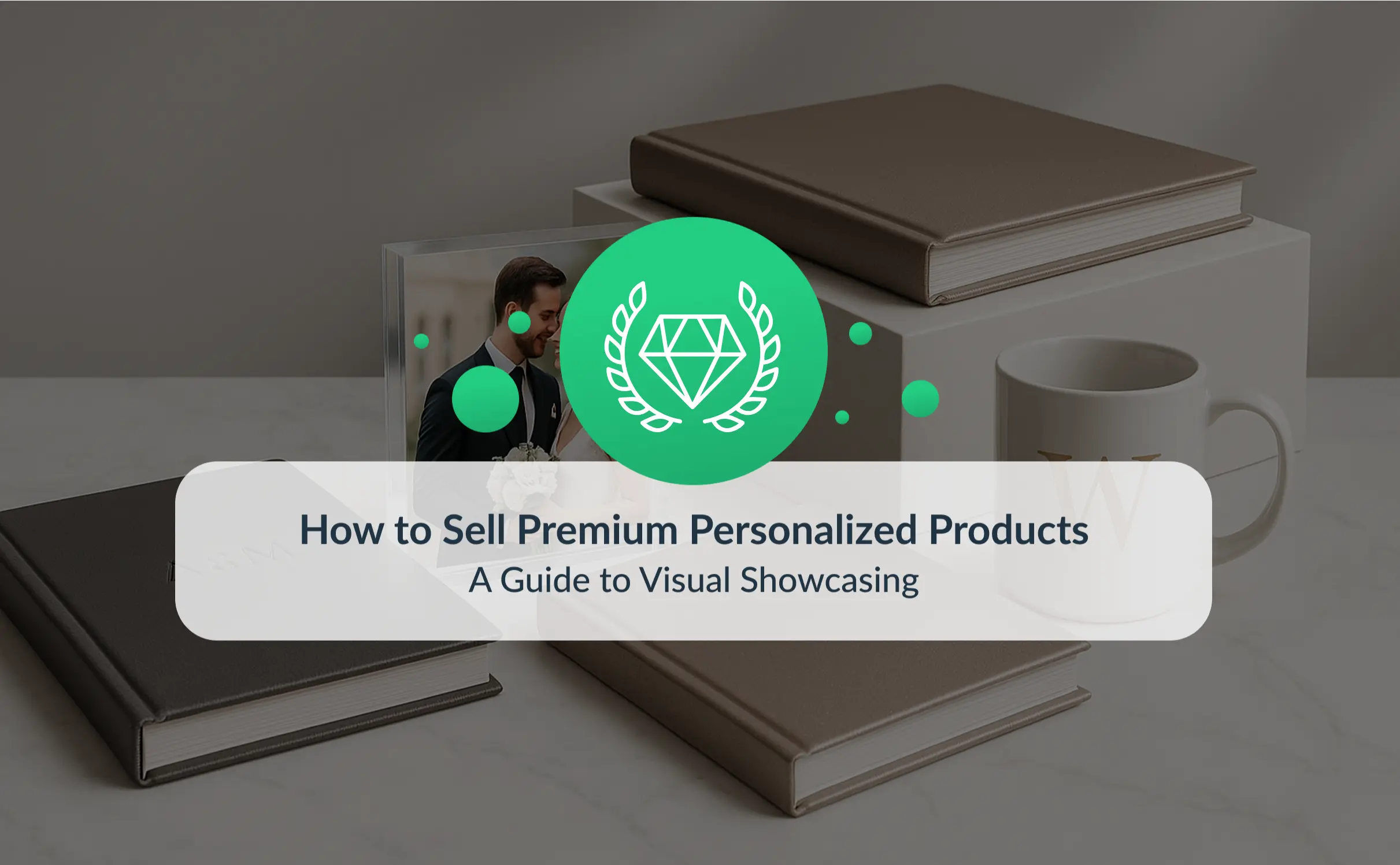Selling premium products online presents a fundamental challenge: customers can’t touch them, feel their weight, or assess the quality of craftsmanship. When the price is higher, digital storefronts must work harder to convey value and build trust. Effective retail product showcasing isn’t just a matter of aesthetics; it’s a key element of your sales strategy that justifies a higher price point and attracts the right customers.
This guide will show you how to use visual presentation to effectively sell premium personalized products, build trust, and justify a higher price. We’ll cover the key elements, from photography to modern showcasing formats, that translate into sales.
Why You Must Show Quality, Not Just Talk About It
In today’s market, a “high-quality” product is defined by more than just materials. It’s a combination of superior craftsmanship, a seamless user experience, and the emotional value it delivers. However, modern consumers are skeptical of marketing claims alone. Stating that your photobook has a “luxurious cover” is not enough. You must provide tangible, visual proof that builds trust and justifies the premium price.
This “show, don’t tell” approach is critical online, where the lack of physical contact creates a trust gap. By transforming abstract promises into concrete, credible arguments, you empower customers to make a confident purchase decision.

5 Ways to Visually Prove Your Product’s Value
To effectively justify a premium price, you need a multi-faceted approach that engages customers visually and emotionally. Here are five key areas where strategic showcasing makes all the difference.
1. Invest in Multi-Format Product Photography
Professional photography is your most powerful tool for conveying quality. One static image is no longer enough. A comprehensive visual strategy should include:
- High-Resolution Studio Shots: These are your foundation. Sharp, well-lit photos on a neutral background allow customers to zoom in and inspect the details – the texture of the paper, the precision of the stitching, the richness of the colors.
- Lifestyle & In-Use Photos: Show your product in a natural context. A photobook on a coffee table or a personalized canvas on a living room wall helps customers visualize the product in their own lives. It builds an emotional connection and demonstrates scale.
- Dynamic and Interactive Formats: Go beyond static images to break the digital barrier.
- 360° Photography gives the customer control, allowing them to examine the product from every angle.
- Short Product Videos are perfect for showing how a product behaves. A clip of someone flipping through a layflat album instantly communicates its quality and durability. These are forms of interactive demos and product showcasing that build immense trust.
- AI-Generated Mockups: For businesses with extensive catalogs, creating photos for every product variation is costly. AI-generated mockups allow for the rapid creation of realistic visualizations at a fraction of the cost, a key application of visual design techniques for product showcasing in UI/UX.
2. Write Descriptions That Sell an Experience
Effective product descriptions must do two jobs at once: inform and inspire. Combine technical specifications with emotional storytelling to appeal to both the head and the heart.
- The Rational Brain Needs Details: Clearly list all necessary information: paper type and weight, binding options, dimensions, ink technology, and available customization features. This builds confidence and answers practical questions.
- The Emotional Brain Needs a Story: Don’t just sell a product; sell the outcome. Frame your descriptions around the experience. How will this photobook help a family relive their most cherished memories? How will this piece of wall art transform a living space? This emotional connection is what truly motivates a premium purchase.
3. Design Packaging as Part of the Product
Your customer’s premium experience doesn’t end at checkout. The packaging is the first physical touchpoint with your brand, and it must reinforce the value of the product inside. A beautifully designed, sturdy box creates a memorable “unboxing experience” and confirms to the customer that they made a smart investment. Delivering a €120 photo album in cheap, flimsy wrapping can instantly destroy the perception of luxury you worked so hard to build.

4. Leverage Modern Showcasing Formats
Beyond your product pages, use dynamic formats to build social proof and reach new audiences. User-Generated Content (UGC) is your most powerful asset here. Encourage customers to share photos of their products on social media with a unique hashtag. Featuring these authentic images on your website and in your marketing acts as the strongest possible endorsement – real people, genuinely happy with their purchase.
5. Build Trust with Transparency and Social Proof
Finally, underpin your visual strategy with transparent processes and credible testimonials.
- Quality Assurance: Briefly explain your quality control process. Do you manually inspect every product? Do you offer a satisfaction guarantee? Communicating this reduces perceived risk.
- Customer Reviews: Actively collect and prominently display reviews and ratings. Most online shoppers trust peer reviews as much as personal recommendations. These testimonials provide the final layer of assurance a customer needs to click “buy”.
Conclusion
Trust is the currency of premium e-commerce. Customers are willing to pay more, but only if you give them compelling reasons to believe in your product’s value before it ever reaches their hands. A beautiful product is not enough; you must tell its story through high-quality visuals, evocative descriptions, and authentic social proof. Investing in strategic visual showcasing isn’t a cost – it’s the most effective way to defend a higher price and build a brand that customers trust for the long term.
What’s Next?
Effective showcasing starts with a platform that gives you the tools to do it right. If you’re ready to move beyond static product pages and create truly compelling visual experiences, we’re here to help.
Want to see how a platform built for premium showcasing can transform your sales? Book a Printbox demo and let us show you. If you have questions about how to improve your current product presentation, our experts are ready for a strategic consultation. Contact the Printbox team to get started.
How can I justify a higher price for my personalized products online?
To justify a higher price, you must visually prove your product's quality and value. Instead of just talking about it, you need to show it through high-quality photos, detailed descriptions, premium packaging, and social proof like customer reviews. The goal is to build trust and give customers the confidence that they are making a smart investment.
What types of product photos best showcase quality?
The best results come from a combination of several photo formats:
- High-resolution studio shots: They allow customers to zoom in and see details like paper texture or stitching quality.
- Lifestyle photos: They show the product in a natural context, helping customers visualize it in their own homes.
- 360° photography and video: They enable an interactive examination of the product from every angle and show how it behaves in motion.
What role does packaging play in selling premium products?
Packaging is a key part of the premium experience and the customer's first physical touchpoint with the brand. Sturdy and aesthetic packaging reinforces the product's perceived value, creates a positive "unboxing experience," and confirms to the customer that they made a good choice. Cheap, careless packaging can destroy the impression of luxury.
How do I write product descriptions that sell premium products?
Effective descriptions for premium products must combine two elements: information and inspiration. On one hand, provide detailed technical specifications (e.g., paper weight, binding type) to answer the customer's rational questions. On the other hand, tell an emotional story about how the product will change the customer's life or help them preserve precious memories.
What is “social proof” and why is it important in online sales?
Social proof is a psychological phenomenon where people assume the actions of others reflect correct behavior. In e-commerce, this means using reviews, testimonials, and user-generated content (UGC) to build trust. Showing that real people are happy with your product is one of the most powerful tools for convincing new customers to make a purchase.




